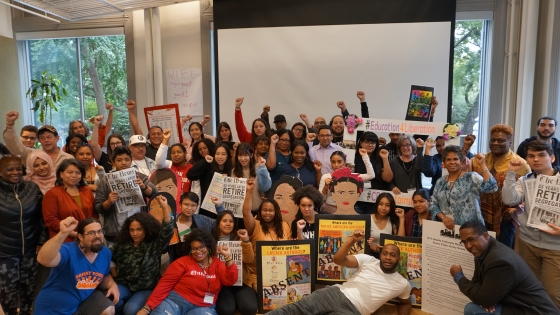
Anne T. Henderson, National Association for Family, School and Community Engagement
Joanna Geller, NYU Metro Center
Context
Parent and community constituencies have long argued that their engagement in everyday schooling, as well as in educational policy and decision-making from the local school to the federal level, would contribute to improving student achievement. Over the last three decades, a growing body of evidence shows that involving families in their children’s education can improve student achievement. Studies also show that initiatives to organize and develop parent leaders can lead to better schools, more effective policies, and increased resources.
Evidence
The research is consistent and convincing: when schools, families, and community groups work together to support learning, children tend to do better in school, stay in school longer, and like school more. These findings hold across differences of class, income, culture, education, ethnicity, and student age (Henderson & Mapp, 2002). Engaging families in schools can lead to improved attendance, higher grades and test scores, better social skills, increased student motivation, and improved behavior (Epstein & Sheldon, 2002; Henderson & Mapp, 2002; Weiss, Lopez, & Rosenberg, 2010; Jeynes 2012).
- Research strongly suggests that the following strategies can have a sustained and positive impact on student learning:
- Building personal relationships, trust, and mutual understanding with families via class meetings, informal one-on-one conversations, and home visits (Geller et al., 2015; Sheldon & Jung, 2018)
- Sharing data with families about student skill levels and strategies for improving those skills (Harvard Family Research Project, 2013)
- Modeling high-impact teaching practices such as dialogic reading and hands-on math activities so families can use them at home (Jeynes, 2012)
- Listening to families’ ideas about their children’s interests and challenges, and using this input to differentiate instruction and enrich the curriculum (Hong, 2019; Mapp, Carvar, & Lander, 2017)
- Incorporating content from families’ home cultures into classroom lessons (Henderson, Mapp, Johnson & Davies, 2007; Bryk & Schneider, 2002; Jeynes, 2005)
A landmark study (Bryk et al., 2010) of low-income schools in Chicago found that schools with “strong ties to families and the community” were four times more likely to make significant gains in reading and math. Strong ties included being informed about community issues and families’ home cultures, inviting families to observe in the classroom, using community resources, working as families with partners to improve learning, and responding to families’ concerns about their children.
Effective Strategies
Through a systematic review of research on school-based family engagement programs, Jeynes (2012) found that programs that supported families to read with their children and programs that promoted positive communication between teachers and families had the strongest positive impact.
True family engagement is more than schools telling families what to do to support their children. True family engagement requires educators to deeply understand, value, and appreciate students and their families. Luis Moll emphasizes the often undervalued “funds of knowledge” that low-income and immigrant families can contribute to students’ academic success. When visiting students’ homes, he found that many Latino families had expertise in topics such as farming, mining, medicine, religion, biology, and math. These rich family practices, which Moll and colleagues termed “funds of knowledge,” often manifest in ways that do not neatly fit into traditional Eurocentric definitions of involvement (Moll et al., 1992; Cooper, 2009; Lopez, 2001).
Hoover-Dempsey’s work demonstrates that strategically designing efforts to engage families can lead to more effective family engagement with schools (Hoover-Dempsey et al. 2005). Three interrelated factors are specially important: role construction (what is the job description of an engaged parent?); efficacy (feeling confident they know how to support their children’s learning) and a sense of invitation (the school welcomes and supports their involvement). School leaders and teachers can influence all three factors.
Larger efforts in community organizing and parent leadership development are mobilizing the community power necessary to improve low-performing schools and change state and federal policy. Multiple studies that researched successful education organizing (Shirley 1997; Warren & Mapp 2001; Gold, Simon, & Brown 2002; Mediratta, Shah & McAlister 2009), and the ripple effects of parent leadership initiatives (Geller et al., 2019) demonstrate that community organizing not only improves individual schooling outcomes but can change district and state policies and increase resources to produce significantly improved student achievement. For example, parent leaders, many from diverse and low-income communities, have led successful campaigns that resulted in increased funding for early childhood programs, district-wide implementation of restorative justice, and passage of the first ballot initiative in the country expanding access to affordable childcare.
In short, successful family engagement at the school level involves building a trusting family-school relationships, linking family engagement with student learning, understanding and valuing cultural differences between families and schools, supporting parent advocacy for all children, and sharing power between parents, teachers, and administrators (Henderson et al., 2007). Principal leadership is also critical; school leaders must spearhead efforts to build the trust that structures successful family engagement (Auerbach, 2009).
Bottom Line
A rich variety of family engagement efforts – ranging from fostering close parent-teacher collaboration to mobilizing parent leaders and community constituencies to improve low-performing schools and increase learning opportunities – can make significant contributions to improving student achievement. Engaging parents and community is an essential strategy for achieving better schools.
Examples of Best Policy/Practice
- Family Engagement Playbook - a collection of promising research-based approaches to strengthen individual competencies and organizational support for meaningful family engagement.
- Dual Capacity - Building Framework for Family-School partnerships - a website for practitioners to learn and share best practices in family and community engagement. It’s designed to support the development of family engagement strategies, policies, and programs. The goal of the website is to bring the Framework to life and help put it into practice across the United States.
Related Research
Auerbach, S. 2009. Walking the Walk: Portraits in Leadership for Family Engagement in Urban Schools. The School Community Journal, 19(1), 9-32.
Bryk, A.S. & Schneider, B. (2002). Trust in schools: A core resource for improvement. New York, NY: Russell Sage.
Bryk, A.S., Bender Sebring, P. Allensworth, E., Luppescu, S., Easton, J.Q. (2010). Organizing schools for improvement: Lessons from Chicago. Chicago, IL: University of Chicago Press.
Epstein, J.L. and Sheldon, S.B. 2002. Present and Accounted for: Improving Student Attendance through Family and Community Involvement. Journal of Educational Research, 95, 308-318.
Geller, J.D., Alcantara, V., Boucher, D., Catone, K., Lopez, R.M., & Tung, R. (2015). What Does it Take to Form Meaningful Connections among Cultural Brokers, Parents, and Teachers? Lessons From A Federal Grant. Journal of Family Diversity in Education, 1(4), 22-44. (Latino).
Geller, Joanna, Jessamyn Luiz, Danielle Asher, Sara McAlister, Anne T. Henderson, Kate Gill Kressley, Wendy Y. Perez, & Joy Sanzone (Eds.) 2019. “The Ripple Effect in Action: What 7 Parent Leadership Initiatives Learned from Participatory Evaluation.” Portland, OR and New York, NY: Dialogues in Action and the Metropolitan Center for Research on Equity and the Transformation of Schools at New York University.
Gold, E., Simon, E., & Brown, C. (2002). Successful community organizing for school reform. Chicago, IL: Cross City Campaign for Urban School Reform.
Harvard Family Research Project, 2013. Tips for Administrators, Teachers, and Families: How to Share Data Effectively.
Henderson, A., and K. Mapp. 2002. A New Wave of Evidence: The Impact of School, Family and Community Connections on Student Achievement. Austin, TX: Southwest Educational Development Laboratory/American Institute for Research.
Henderson, A, K. Mapp, V. Johnson, and D. Davies. 2007. Beyond the Bake Sale: The Essential Guide to Family/School Partnerships. New York: New Press.
Hong, S. 2019. Natural allies: Hope and possibility in teacher-family partnerships. Cambridge, MA: Harvard Education Press (Available in October, 2019)
Hoover-Dempsey, K. V., J. M. T. Walker, H. M. Sandler, D. Whetsel, C. L. Green, A. S. Wilkins, and K. E. Clossen. 2005. “Why Do Parents Become Involved? Research Findings and Implications,” Elementary School Journal 106, no. 2:105–130
Jeynes, W.H. (2005). A Meta-Analysis of the Relation of Parental Involvement to Urban Elementary School Student Academic Achievement. Urban Education, 40(3), 237-269.
Jeynes, W. (2012). A Meta-Analysis of the Efficacy of Different Types of Parental Involvement Programs for Urban Students. Urban Education, 47, 706-742.
Lopez, G. (2001). The Value of Hard Work: Lessons on Parent Involvement from an (Im)migrant Household. Harvard Educational Review, 71(3), 416-438.
Mapp, K., Carver, I., & Lander, J. (2017). Powerful Partnerships: A Teacher’s Guide to Engaging Families for Student Success. New York, NY: Scholastic.
Mediratta, K., S. Shah, S., and S. McAlister. 2009. Community Organizing for Stronger Schools: Strategies and Successes. Boston, MA: Harvard Education Press.
Moll, L.C. Amanti, C., Neff, D., & Gonzalez, N. (1992). Funds of Knowledge for Teaching: Using a Qualitative Approach to Connect Homes and Classrooms. Theory into Practice. 31(2), 132-141.
Sheldon, S. & Jung, S.B. (2015). The Family Engagement Partnership Student Outcome Evaluation. Baltimore, MD: Johns Hopkins University.
Shirley, D. (1997). Community organizing for urban school reform. Austin, TX: University of Texas Press.
Warren, M.R. & Mapp, K.L. (2011). A match on dry grass: Community organizing as a catalyst for school reform. New York, NY: Oxford University Press.
Weiss, H.B., Lopez, M.E., & Rosenberg, H. (2010). Beyond Random Acts: Family, School, and Community Engagement as an Integral Part of Education Reform.
Author
Anne T. Henderson, Senior Consultant
National Association for Family, School and Community Engagement
Joanna Geller, Assistant Director of Research
NYU Metropolitan Center for Research on Equity and the Transformation of Schools

